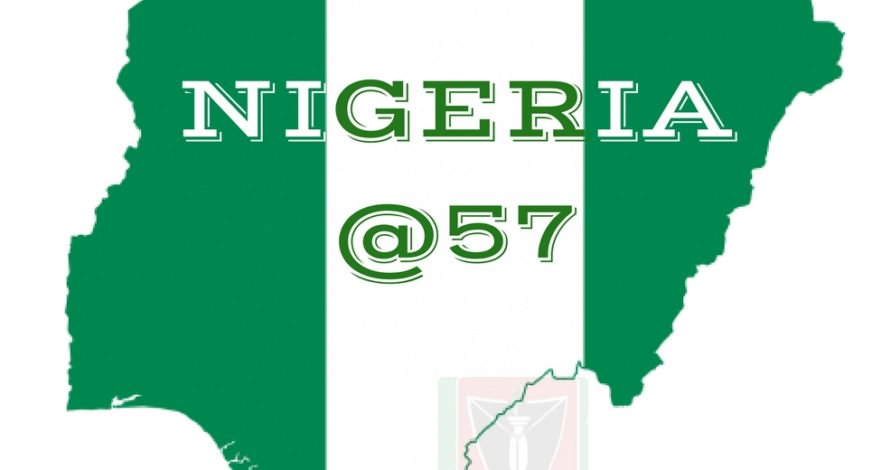On Sunday, October 1, 2017, Nigeria, the self-acclaimed giant of Africa turns 57 as an independent country having gained political independence from Britain in a colourful ceremony which witnessed a peaceful transfer of power in the morning of October 1, 1960, at the Race Course, Ikoyi, Lagos.
The journey to the independent nation of Nigeria actually started in 1914 when the Northern and Southern Protectorates of the Lower Niger were merged for purely administrative convenience under the superintendency of Sir Frederick Lord Lugard. It was Lugard’s girlfriend, Flora Shaw, who encouraged him to name the new territory- Nigeria- her own way of seeing the new entity of belonging to the Niger area.
So far, the country had witnessed nine military regimes (including Interim National Government) and six civilian governments including President Muhammadu Buhari. During this period, Nigeria has witnessed her ups and downs in every facet of human endeavour. In the education sector, we have top level doctors, engineers, economists, teachers, lawyers, literary gurus, among others who have achieved maximally both at national and international levels. In the communication sector, the country has improved significantly through the introduction of the Global System for Mobile communications, which aids speedy communication across our borders. Moreover, there are many government and private-owned radio and television stations.
Indeed, what seems to be our greatest achievement besides the huge population and land mass, is the 18 years of uninterrupted democratic rule – by far, the most globally accepted form of government. The seeming stabilization of democracy was exemplified in 2015 when there was a peaceful transfer of power from one administration to another, in an election the then President, Dr. Jonathan Goodluck was defeated by President Buhari. In the area of foreign policy, Nigeria has made strides and at one point the Country was a highly respected country in Africa and in international politics under the old regime of President Olusegun Obasanjo. She has built many interstate and intrastate road networks and provided railways for her citizenry.
Despite these achievements, the country is confronted with social, political, economic and religious challenges with attendant anomie, internal violence, crushing poverty, severe infrastructural deficit, uninspiring leadership at all levels, corruption, huge unemployment figures and regional strife, weak institutions, general indiscipline, nepotism, deteriorating social conditions and a corrupt judicial system, among others.
As the country marches steadily towards attaining six decades of nationhood, it is time to focus on priorities to better the social conditions of an average Nigerian. Indeed, Nigeria holds the key to the development of Africa, for as a one-time US President Bill Clinton aptly puts it in his autobiography It is difficult to imagine a bright future for sub- Saharan Africa without a more successful Nigeria – by far, its largest population. We, therefore, call on the Federal Government to provide uninterrupted electricity, efficient transportation system, massive job creation, qualitative and affordable health-care delivery service and qualitative and efficient educational systems as well as invest in agriculture for the Country to attain food security.
On the agitations and threats posed to the country’s indivisible profile, we enjoin the Federal Government to hearken to the wise counsel of Ray Ekpu, a one-time Chief Executive Officer of Newswatch Communications Limited, who opines I believe we ought to have a meeting point, where people can bring their grievances to the table, and we discuss and dialogue and consult each other, and make concessions. Life is a case of give-and-take, and the life of a nation is the same thing. You have several components forming the nation. They must give and take for the country to move forward.
On the clamour for restructuring, we call on the different authorities in the country not to throw away the baby with the bath water by listening to the voices of reason. Ekpu again suggests So, restructuring is absolutely necessary. Some of these agitations that we are seeing, are products of the kind of system that we now have, which has created a lot of unemployment, a lot of poverty that hasn’t been alleviated, unemployment that hasn’t been dissipated, and these have propelled youths to say ‘where is our future?’. And the future is being gradually mortgaged because we are borrowing a lot of money now to solve resident problems and people will have to pay for the money with interest in the years to come. So, the future of the youths is bleak right now, and about 70 per cent of Nigeria’s populations are made up of youths.
A situation where most states in the country are unable to generate internal revenue calls for great concern. The call for creation of state police, introduction of hate into our country’s political vocabulary, indiscriminate issuance of quit notices to some ethnic nationalities, falling standards of education, incessant strikes by organized labour groups, insecurity to life and property, no clear-cut policy for sports development at the grassroot, non-implementation of sound industrial policies especially for small and medium scale enterprises, poorly implemented intervention policies in the aviation sector coupled with dearth of national carrier and lack of technological advancement should be given prompt attention.
As the country clocks 57 and marches into the future with renewed hope and vigour, we appeal to various leaderships in Nigeria to set their priorities right to enable the present and unborn generations to reap from such sacrifices.
Happy Independence Anniversary, Nigeria!

